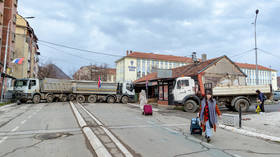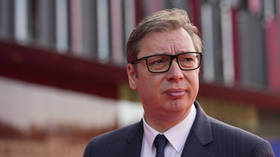Belgrade calls on Kosovo Serbs to remove barricades

Serbian President Aleksandar Vucic met with representatives of the Kosovo Serbs on Wednesday and asked them to dismantle roadblocks they had erected, Belgrade’s commissioner for Kosovo, Petar Petkovic, has told a press conference.
Ethnic Serbs in the north of the breakaway province had put up roadblocks three weeks ago, in protest over the arrest of several Serbs and the deployment of heavily armed ethnic Albanian police in their communities.
The request to dismantle the roadblocks came after the EU and US gave written guarantees that “participants in the peaceful protests against [ethnic Albanian PM Albin] Kurti’s terror will not be arrested,” according to Goran Rakic, a local Serb political leader, who spoke to Serbian channel TV Pink. Moreover, NATO’s peacekeeping force KFOR also issued new guarantees that “Kosovo Security Forces” won’t be deployed to the Serb-majority counties in the north of the province, he added.
Pristina’s police were not supposed to be in the north, under the provisions of the 2013 Brussels Agreement with Belgrade, which Kurti’s government has said it had no intention of honoring.
The trucks and tractors blocking roads in the north of Kosovo have not yet been removed, however, as the local Serbs are waiting for a visit from Vucic himself, anticipated later in the evening.
“We don’t trust Kurti’s government. I can say we don’t trust international guarantees, either,” said Rakic.
NATO bombed Serbia in 1999 and handed control of Kosovo to ethnic Albanian separatists, who declared independence in 2008 and have demanded recognition from Belgrade ever since. With support from Russia and China, Serbia has resisted US and EU pressure to do so.
The current standoff began in late July, when Kurti tried to abolish the use of Serbian documents and license plates in the north. After the EU and the US persuaded Kurti to drop the plan, at the end of November, he deployed police to the north and had Dejan Pantic – one of the ethnic Serb officers who resigned in protest over Kurti’s policies – arrested on charges of terrorism.
On Wednesday morning, a Kosovo court ordered Pantic released to house arrest, citing medical concerns. Kurti’s party described the decision as “an act of treason,” according to the Pristina daily Koha. Local Serbs claim that Pantic remains in custody, however.













